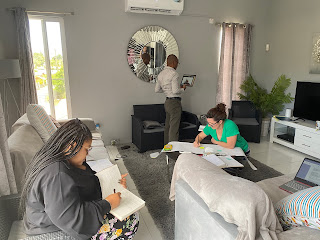The inaugural eastern Caribbean regional conference on inclusive education occurred from February 26-28, 2025 in Rodney Bay, St Lucia. The title of the conference was: Building research and professional networks to support inclusive education for students with disabilities in the eastern Caribbean.
The overarching question guiding the conference was: How can researchers and educational system leaders collectively work to foster inclusive education for students with disabilities and special educational needs in the eastern Caribbean?
The conference had four specific objectives:
Objective #1: Provide an inter-sectoral knowledge exchange on inclusive education through presentations, discussions, resource-sharing, and resource development.
Objective #2: Facilitate the development of connections to support future collaborations in research and practice focused on inclusive education.
Objective #3: Support the creation of a working group that will engage in future research priorities, formal research partnerships, and collaborative networks in inclusive education.
Objective # 4: Mobilize knowledge beyond the conference through the development of research-informed resource materials on inclusive education for various stakeholder audiences.
How did the conference come to be? As a result of a conversation over dinner two years ago. I had come to St Lucia to participate in another conference and was introduced to Mr. Dale St Juste, education officer with leadership responsibility for special education in the St Lucia Ministry of Education, Sustainable Development, Innovation, Science, Technology and Vocational Training. As we had dinner, I was struck by his comment that he did not know people with similar responsibility in the surrounding islands. As we talked about the challenges of supporting students with disabilities and special educational needs in St Lucia, we decided to put effort into bringing the leaders from the surrounding islands together to network, share resources, and simply get to know each other (see Objectives 1-4 above). We successfully applied for and received a Social Sciences and Humanities Research Council (SSHRC) of Canada Connection Grant (it was the #1 ranked application, just saying!) and started planning for the conference.
 |
| Mr. Dale St Juste welcoming participants to the conference |
In addition to Mr. Juste, other representatives from the Ministry of Education participated in the conference. Miss Angel Caglin of the Caribbean Innovation and Leadership Lab, gave leadership to facilitating discussions at the conference.
 |
| Miss Angel Caglin presenting |
The Honourable Shawn Edward, Minister of Education for St Lucia, started the conference with a call to include and further improve education for disabled students and those with special educational needs. The conference was honoured to have other high level officials in attendance including the Chief Education Officer, Mrs. Beverly Dieudonne, and the deputy CEO, Mr. Cyrus Cepal. Dr. Kathy Hogarth, associate vice-president of global strategy at Wilfrid Laurier University in Canada, was also in attendance and provided greetings.
 |
| Dr. Kathy Hogarth, associate vice-president of global strategy at Laurier; Honourable Shawn Edward, Minister of Education for St Lucia; Mrs. Beverly Dieudonne, Chief Education Officer for St Lucia |
In addition to St Lucia, representatives from the countries of Anguilla, Antigua & Barbuda, Dominica, Barbados, British Virgin Islands, Grenada, St. Kitts and Nevis, Montserrat, and St Vincent and the Grenadines were present.
We were delighted by the active participation in the conference of Mrs. Sisera Simon and Mr. Rafer Gordon, the top education officials from the Organization of Eastern Caribbean States (OECS). The OECS is the "connected tissue" that supports regional integration in the eastern Caribbean.
 |
| Conference Organizing Team |
The organization of the conference was supported by Canadian participants including Dr. Jacqueline Specht, Dr. Kimberly Maich, Dr. Jhonel Morvan, and myself. Dr. Specht and I provided keynote addresses which focused on an overview of research on inclusive education globally and case examples of inclusive education policy to practice in small island states.
 |
| Dr. Sider speaking |
At the conclusion of the conference, participants indicated that the objectives had been met, that they had established new professional relationships, and nurtured their own leadership competencies to support inclusive education for students with disabilities and special educational needs. The group looks forward to further collaborative opportunities to build capacity for inclusive education in the eastern Caribbean. The group has already begun actively sharing resources and developing a community of practice.
A conference of this magnitude could not occur without significant support from multiple sponsors and funders. These included:
Saint Lucia Ministry of Education, Sustainable Development, Innovation, Science, Technology and Vocational Training
Social Sciences and Humanities Research Council (SSHRC) of Canada
Wilfrid Laurier University Faculty of Education
Wilfrid Laurier University Office of Research Services
Office of Global Strategy at Wilfrid Laurier University
Canadian Research Centre on Inclusive Education
Caribbean Innovation & Leadership Lab










